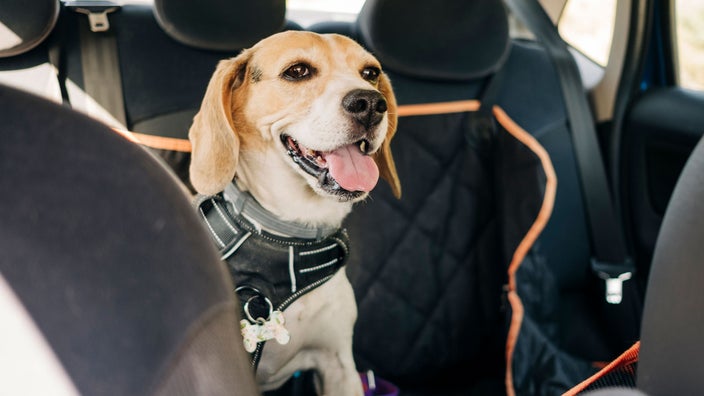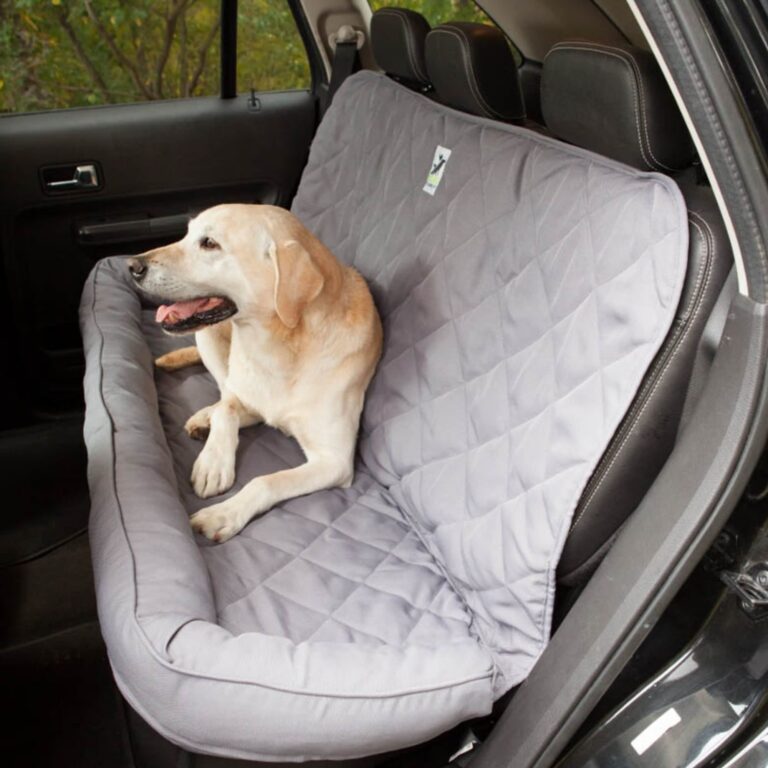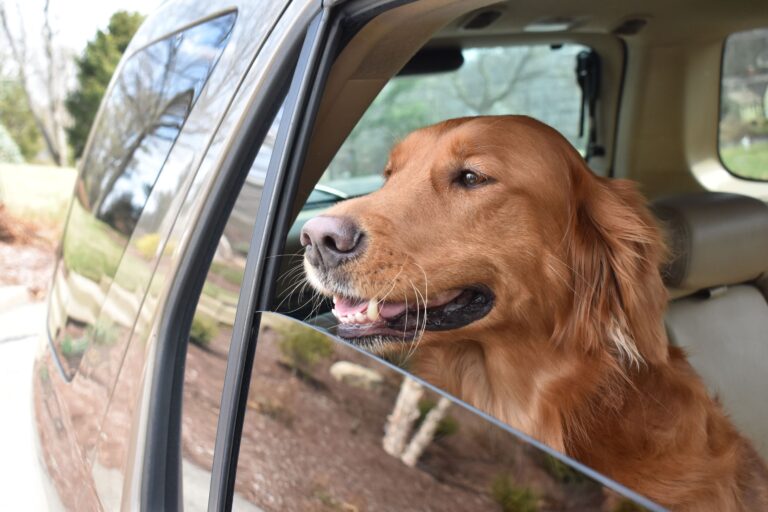Can I Leave My Dog in the Car With the AC On? Risks & Tips
Leaving your dog in the car with the AC running is not safe. Mechanical failures can occur, endangering your pet’s life.
Leaving pets in cars, even with the air conditioning on, poses significant risks. The engine could stop, or the AC might malfunction, causing the car to overheat. Dogs can suffer from heatstroke quickly, leading to severe health issues or even death.
It’s essential to understand that cars can become dangerous environments for pets in a very short time. Even with the AC running, leaving your dog unattended in a vehicle should be avoided to ensure their safety and well-being. Always seek safer alternatives, such as leaving your pet at home or finding a pet-friendly location.

Credit: www.facebook.com
The Dangers Of Leaving Dogs In Cars
Many pet owners think leaving their dog in the car with the AC running is safe. This assumption can be dangerous. Even with the AC on, several risks can harm your furry friend. Understanding these dangers can help prevent accidents and keep your dog safe.
Temperature Fluctuations
Car temperatures can change quickly. The AC might fail without warning. This can cause the car to heat up rapidly. A sudden rise in temperature can lead to heatstroke in dogs. Even a slight temperature increase can be harmful. Dogs are more sensitive to heat than humans.
Here is a quick look at how fast car temperatures can rise:
| Time | Temperature Increase |
|---|---|
| 10 minutes | 20 degrees |
| 30 minutes | 30 degrees |
| 60 minutes | 40 degrees |
Even a quick errand can turn dangerous. Always monitor car temperatures closely.
Limited Air Circulation
Even with the AC on, air circulation in a parked car is limited. Dogs need fresh air to breathe easily. Limited air circulation can cause breathing problems. The car’s AC system might not provide enough fresh air. Your dog could feel trapped and anxious.
Consider these points about air circulation:
- Parked cars do not have good airflow.
- AC systems recycle the same air.
- Dogs need fresh air to stay healthy.
Ensuring your dog has enough fresh air is crucial. Never leave them in a car for long periods.

Credit: www.petsbest.com
Legal Implications And Liability
Leaving your dog in the car, even with the AC running, can have serious legal consequences. Understanding the laws and potential liabilities is crucial for every pet owner.
State Laws And Penalties
Each state has different laws regarding pets left in vehicles. Many states prohibit leaving animals unattended in cars. Even with the AC running, you could face penalties.
Here is a table outlining some state laws:
| State | Law | Penalty |
|---|---|---|
| California | Illegal to leave pets in hot or cold cars | Up to $500 fine |
| Florida | Pets must not be left in cars if they are in danger | $100 fine |
| New York | Pets cannot be left in cars under extreme conditions | Up to $200 fine |
Consequences Of Negligence
Neglecting your dog in a car can lead to severe consequences. Even if the AC is running, mechanical failures can occur.
Here are some potential consequences:
- Heatstroke: AC failure can cause temperatures to rise quickly.
- Legal Action: Authorities can charge you with animal cruelty.
- Public Backlash: Social media can amplify negative attention.
Always consider the safety and well-being of your furry friend. Leaving a dog in the car is risky and often illegal.
Physiological Stress On Dogs
Leaving your dog in the car, even with the AC running, can cause significant physiological stress. Dogs are sensitive to temperature changes and can suffer from various health issues. Understanding these risks helps ensure your pet’s well-being.
Signs Of Heatstroke
Dogs can experience heatstroke quickly. Here are some signs of heatstroke in dogs:
- Panting heavily
- Drooling excessively
- Rapid heartbeat
- Vomiting
- Weakness or collapse
Recognizing these symptoms early can save your dog’s life. If you notice any signs, seek veterinary help immediately.
Long-term Health Effects
Long-term exposure to high temperatures can lead to chronic health issues. Some of the long-term health effects include:
- Respiratory problems
- Heart issues
- Neurological damage
These conditions can significantly reduce your dog’s quality of life. Always prioritize your pet’s safety to avoid these long-term effects.
False Security Of Air Conditioning
Many pet owners think leaving their dog in the car with the AC running is safe. This belief gives a false sense of security. Air conditioning can fail unexpectedly, putting your dog at risk.
Ac Failures
Car air conditioners are not always reliable. They can break down or stop working without warning. A sudden AC failure can quickly turn a safe environment into a dangerous one. Your dog could suffer from heatstroke in a matter of minutes.
Consider the following potential issues with car AC systems:
| Problem | Impact on Dog |
|---|---|
| AC Compressor Failure | Rapid rise in car temperature |
| Low Refrigerant Levels | Insufficient cooling |
| Electrical Issues | Complete AC shutdown |
False Perception Of Safety
Leaving the AC on can create a false perception of safety. Owners may feel their dog is protected from the heat. In reality, many factors can compromise the AC’s effectiveness.
- The car may run out of gas.
- Someone could accidentally turn off the engine.
- Technical malfunctions can occur.
Even with the AC running, the car can still become unsafe. Dogs need fresh air and the ability to move freely. A car, even with AC, limits their space and can cause stress.
It’s always best to avoid leaving your dog in the car. Find alternatives to keep your furry friend safe and comfortable.
Behavioral Concerns And Anxiety
Leaving your dog in the car with the AC running might seem like a safe option. But behavioral concerns and anxiety can make this decision problematic. Dogs have complex emotional needs, and being left alone in a car can trigger various behavioral issues.
Separation Anxiety In Dogs
Many dogs suffer from separation anxiety. This condition makes them feel extreme stress when left alone. In a car, this anxiety can become even worse. The confined space can make your dog feel trapped, causing them to panic.
Signs of separation anxiety include:
- Excessive barking or howling
- Pacing or restlessness
- Drooling or panting
These behaviors are not just annoying. They indicate that your dog is in distress. Stress can lead to health issues like increased heart rate and digestive problems.
Potential For Destructive Behavior
Dogs with anxiety might resort to destructive behavior. This can be even more dangerous in a car. They might chew on seats, seatbelts, or even the dashboard. This not only damages your car but can also harm your dog.
Common destructive behaviors include:
- Chewing or scratching surfaces
- Ripping upholstery
- Damaging car controls
In extreme cases, dogs might try to escape. They could break windows or hurt themselves trying to get out. Safety risks increase if your dog manages to turn off the AC or start the car.
| Behavior | Impact |
|---|---|
| Chewing | Damage to car interior |
| Barking | Noise pollution, stress |
| Panting | Overheating risk |
Understanding these behaviors helps in making informed decisions. Leaving your dog in a car, even with the AC running, can lead to severe issues. Always prioritize your dog’s mental health and well-being.
Safety Tips For Traveling With Dogs
Traveling with your dog can be a fun adventure. But it’s important to keep safety in mind. Here are some tips to ensure your furry friend is safe and comfortable during the journey.
Proper Ventilation
Ensure your car has good air flow. Crack the windows slightly to allow fresh air in. This helps your dog breathe easily.
Never leave your dog alone in a car. Even with the AC running, cars can become hot quickly. Always keep an eye on your pet.
Regular Breaks
Take breaks every 2 hours. This allows your dog to stretch and relieve itself.
Offer water during breaks. Keeping your dog hydrated is crucial during long trips.
| Break Frequency | Activity |
|---|---|
| Every 2 hours | Stretch and relieve |
| Every 4 hours | Offer water |
Use a leash during breaks. This ensures your dog stays safe and doesn’t run off.
- Crack windows slightly for air flow.
- Never leave your dog alone in the car.
- Take breaks every 2 hours.
- Offer water during breaks.
- Use a leash during breaks.
Alternatives To Leaving Dogs In The Car
Leaving your dog in the car, even with the AC running, can be risky. Here are some alternatives to ensure your pet’s safety and comfort.
Pet-friendly Establishments
Many places welcome dogs. Search for pet-friendly establishments in your area. This can include:
- Restaurants with outdoor seating
- Shopping malls that allow pets
- Parks and recreational areas
Use resources like BringFido to find these spots. They list thousands of pet-friendly places around the world. Always call ahead to confirm their policies.
Using Pet Sitters
A pet sitter can be a great option. They can watch your dog at home or take them for a walk. Here are some benefits:
- Your dog stays in a familiar environment
- They get personal attention
- You can avoid stressing your pet with car rides
Use services like Rover or Care.com to find trusted sitters. Always check reviews and meet the sitter beforehand.
| Option | Pros | Cons |
|---|---|---|
| Pet-Friendly Establishments |
|
|
| Using Pet Sitters |
|
|
Choosing these alternatives ensures your dog stays safe and happy.
Credit: www.quora.com
Public Awareness And Intervention
Leaving a dog in a car, even with the AC running, can be dangerous. Public awareness and intervention are essential to ensure the safety of pets. Many people may not realize the risks involved. Education and vigilance can make a significant difference. Knowing how to recognize a dog in distress and what steps to take can save lives.
How To Recognize A Dog In Distress
Recognizing a dog in distress is crucial. Here are some signs to look out for:
- Excessive panting: The dog is breathing heavily and rapidly.
- Drooling: The dog has thick saliva and is drooling excessively.
- Restlessness: The dog is pacing or moving around anxiously.
- Whining or barking: The dog is vocalizing its discomfort.
- Weakness or collapse: The dog appears weak or unsteady.
Steps To Take If You See A Dog In A Car
If you see a dog in a car, follow these steps:
- Assess the situation: Check if the car is parked in the shade and if the windows are open.
- Check for signs of distress: Look for the signs mentioned above.
- Note the time: Keep track of how long the dog has been in the car.
- Find the owner: Go into nearby stores and ask if anyone owns the car.
- Call for help: If the owner is not found, call the local authorities or animal control.
- Stay by the car: Wait for help to arrive, and monitor the dog’s condition.
Public awareness and quick intervention can prevent tragic outcomes for pets left in cars.
Frequently Asked Questions
At What Temperature Is It Ok To Leave A Dog In The Car?
It’s unsafe to leave a dog in a car at any temperature above 70°F. Cars heat up quickly and can be deadly.
Is It Ok To Leave Ac On For Dog?
Yes, it’s safe to leave the AC on for your dog. It helps maintain a comfortable temperature and prevents overheating.
Is It Illegal To Leave Your Dog In The Car While It’s Running?
Leaving your dog in a running car can be illegal. Laws vary by location. Always check local regulations.
Can You Leave A Dog In A Car On A Cool Night?
No, leaving a dog in a car, even on a cool night, is unsafe. Temperatures can still rise, causing harm.
Conclusion
Leaving your dog in the car with the AC running poses risks. Mechanical failures can happen unexpectedly. Always consider safer options for your pet’s well-being. Use pet-friendly establishments or find a trusted sitter. Prioritize your dog’s safety to avoid potential dangers.
Responsible pet care ensures happy and healthy companions.
- Can I Get in a Taxi Without a Car Seat? - January 26, 2025
- Can I Get Chlamydia From a Toilet Seat? - January 26, 2025
- Can I Get an Uber With a Car Seat? - January 26, 2025






